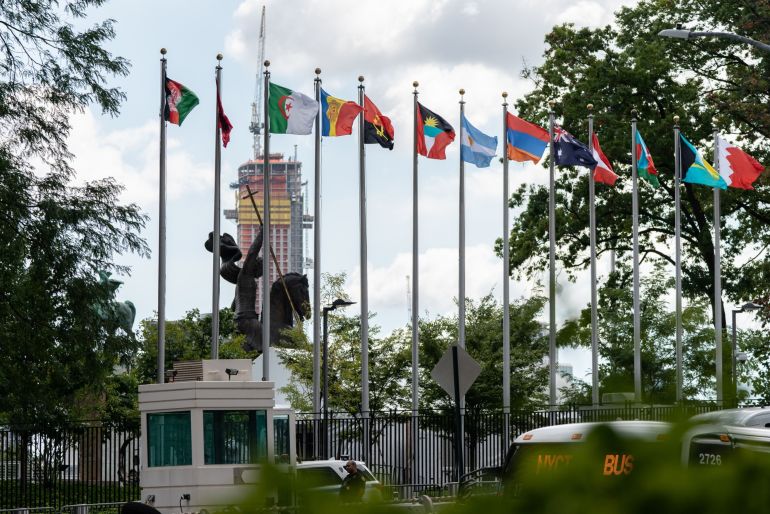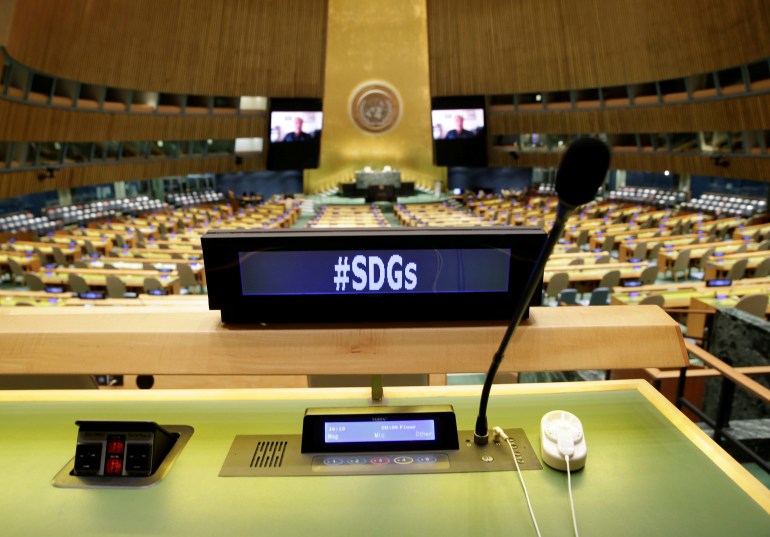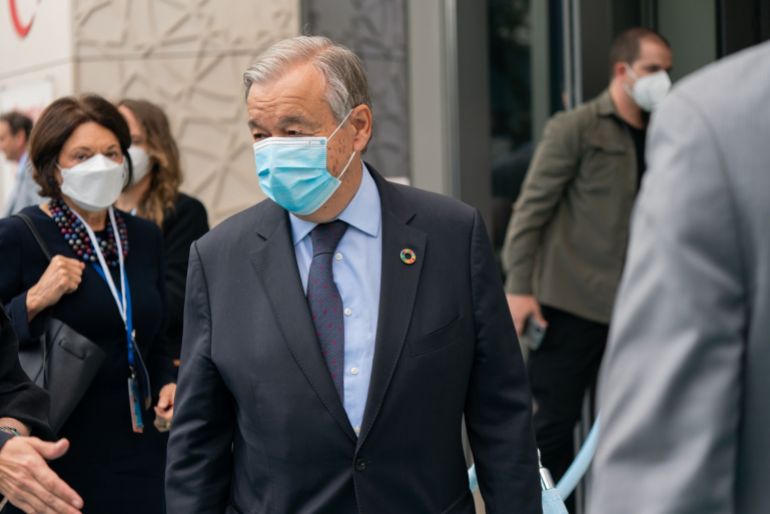United Nations: Challenges grow but not the budget to meet them
The United Nations is faced with doing more with less as international leadership gets tested in the COVID-19 era.

New York City, the United States – The United Nations’ budget is not growing but the challenges it faces are.
As it kicks off its annual high-level General Assembly session in New York City on Tuesday, the 193-member organisation will try to unify an international community struck by a deadly coronavirus pandemic and a lopsided global economic recovery that is only worsening the divide between the world’s haves and have-nots.
Keep reading
list of 4 itemsPfizer says COVID vaccine safe for children 5 to 11 years old
Evergrande, Instagram’s harm to teen girls, and India’s K-craze
As rich-poor divide widens between nations, UN urges reform
The UN has seen its share of challenges in recent years: Security Council stalemate on Syria, an unprecedented refugee and migrant crisis, a global health crisis that has yet to be reined in – particularly in developing countries – and crippling funding cuts under the administration of former United States President Donald Trump.
COVID-19 continues to ravage developed and developing countries as demand grows for more financial aid, vaccines, and a unifying and guiding voice to lift all nations from the perils of the pandemic.
The coronavirus is sure to be a main pillar of UN Secretary-General Antonio Guterres’s message when he delivers his annual address on Tuesday. He is expected to call for greater unity among UN member states and for developed countries with the means and vaccines to extend more help to nations that are less well off.
Last October, when presenting the UN’s nearly $3bn budget for 2021 – a net reduction of 2.8 percent from 2020 – Guterres warned member states that the organisation was being asked to do more with less and struggling to fulfil its mandate.
“We are being forced to operate not on the basis of strategic direction, but rather on the availability of cash, which undermines mandate implementation,” Guterres said.
In the 11 months since then, the demands on the UN have not abated, but it has gotten some budget relief under the new US administration of President Joe Biden.
A friendlier US administration
Since the UN was founded in 1945 from the ashes of World War II, the US has served as its largest donor.
In 2019, the US contributed 22 percent of the UN’s core budget and 25 percent to its peacekeeping budget, affording the superpower, host country and permanent Security Council member a certain level of clout within the organisation.
Former US President Trump turned that decades-long symbiotic relationship upside down by closing up the funding taps. His administration pulled funds from the core budget of the UN as well as some of its agencies, including the United Nations Population Fund (over abortion), the United Nations Relief and Works Agency (which gives aid to Palestinians), and the World Health Organization (amid a global pandemic).
States with developing and emerging economies were vocally critical of Trump’s stinginess. Speaking last October, Guyana’s representative on behalf of the Group of 77 developing countries and China slammed the US for withholding funds from the UN.
“It is unacceptable that this member state clings on to its special privileges, while slowly bankrupting the organisation and the multilateral system,” Guyana’s delegate said.
But the US opened the cash taps again after President Biden took office, paying its dues and signalling a renewed commitment to the UN.
“The administration that preceded [Biden] was downright hostile to the UN,” P. Terrence Hopmann, professor of International Relations at the Johns Hopkins School of Advanced International Studies, told Al Jazeera.

Richard Stoll, professor of political science at Rice University’s Baker Institute for Public Policy, told Al Jazeera that Biden can seize the opportunity to push for more equitable financial burden sharing.
“One can argue that since the United States now has about 15 percent of the world’s GDP [gross domestic product] that its contribution to the UN should be smaller and that other countries – for example, China – should increase their effort,” Stoll told Al Jazeera.
China’s contributions, which are 12 percent of the UN’s core budget, are second only to those from the US. And its influence in the organisation will continue to grow under President Xi Jinping, according to Jeffrey Feltman, who served as the UN’s under-secretary-general for political affairs from 2012 to 2018.
China has in recent years expanded its reach within the UN’s development and peace and security work and has the healthy financial standing to continue to grow its international footprint. It is already one of five permanent members of the Security Council holding an all-important veto card, and is not afraid to use it on issues from Syria to Sudan.
“There is a lot of opportunity for China to step up, and just like any other large power it has its own interests to promote,” Hopmann of Johns Hopkins told Al Jazeera, adding that the UN can and should be used as a tool to manage tensions between major superpowers like the US, China and Russia.
Bigger challenges, but not bigger resources
The UN is staring down the barrel of some mega-sized challenges, from the pandemic to climate change to achieving its Sustainable Development Goals (SDGs) within its ambitious schedule.
The SDGs are the UN’s development blueprint and encompass 17 targets focusing on issues that include ending poverty, promoting education, improving maternal health and achieving gender parity, among others.

The UN’s 193 member states pledged to make good on the SDGs by 2030, but with less than nine years left and a world-changing pandemic, ambitions have certainly been tempered.
“I think the challenges are that many countries are still grappling with the impact of COVID and may be reluctant to commit to those goals until they feel that have their own problems under control,” Stoll of Rice University told Al Jazeera.
The UN continues to sound the alarm on the uneven global economic recovery and access to vaccines. It recently warned that developing countries could be $8 trillion poorer over the next decade as a consequence of the coronavirus crisis.
“Until that situation improves, I can imagine [developing countries] will be less inclined to commit – especially money – to the UN,” Stoll added.
But while some countries may be tightening their purse strings, demand for UN aid and services is only growing. The percentage of the world population that suffers moderate or severe food insecurity has grown from 22.6 percent in 2014 to 30.4 percent in 2020, according to the United Nations Children’s Fund.
Special political missions
Nearly one-quarter of the UN’s core budget goes to financing special political missions, which are set up in countries undergoing or emerging from conflict. The missions are mandated to oversee democratic elections and peace negotiations and help strengthen multilateral institutions.
There are currently 39 such missions, and they take up to 24 percent or $707m of this year’s resources, according to the UN.

UN special political missions can be found in Iraq, Afghanistan, Yemen, Somalia, Libya and Colombia, among other countries.
While member states regard special political missions as a crucial part of the UN’s global peace and security pillar, there is criticism among some member states that these missions have grown significantly in recent years and are eating up too much of the UN’s regular budget.
There are growing calls for a separate special political missions budget – not unlike the Department of Peace Operations budget – that would clearly show how funds are spent rather than having funds be tucked under the umbrella of the wider UN budget.
At a UN budget meeting last year, Cuba’s representative said member states that sit on the Security Council and have the power to create these missions should take responsibility for financing them.
“It is illogical that these missions are financed through the regular budget,” Ana Silva Rodriguez Abascal told the committee. “[It] amounts to 24 percent of resources allocated to it, an increase of two percentage points compared to the 2020 budget.”